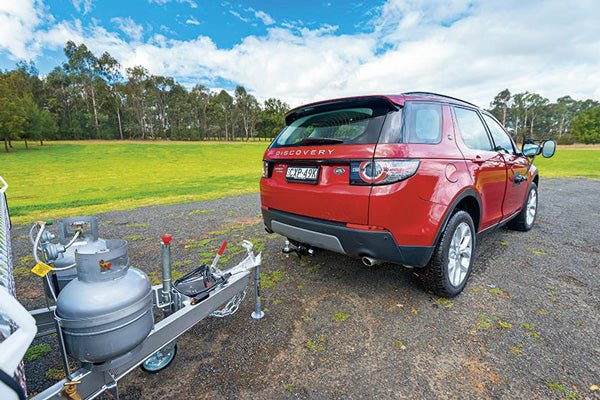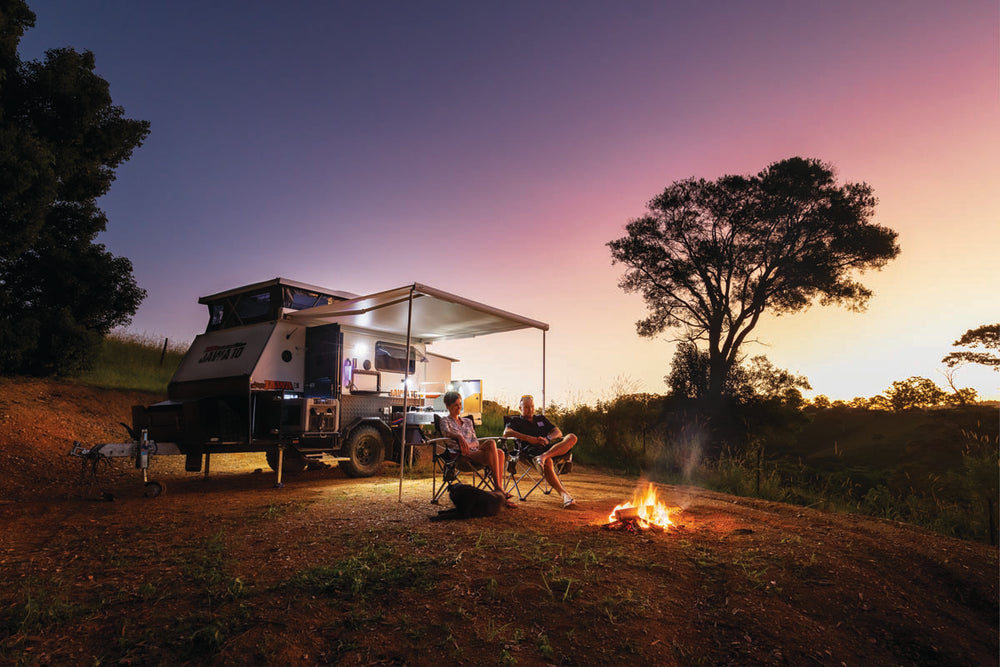LAND ROVER DISCOVERY SPORT SD4 SE: TOW TEST

Land Rover is on a march to broaden its portfolio of SUVs and this, the Discovery Sport, is the latest to come from the green-oval brand. While its lighter, smaller platform does not have the towing capacity of Land Rover’s larger models, it’ll still tow a tandem with shower/toilet. Better still, it costs a significant wedge less than the bigger Landies and is more efficient with it.
The Disco Sport’s L550 platform is modelled on the Range Rover Evoque’s underpinnings, although half the parts are new. The rear suspension is an all-new multi-link design and aluminium is used for the bonnet, roof and tailgate pressings in an effort to save weight – and to keep the heavy stuff down low to improve the vehicle’s centre of gravity.
ATTRIBUTES
The all-new ‘baby Disco’ has a comprehensive suite of standard safety features, including autonomous emergency braking, lane departure warning, seven interior airbags and a pedestrian airbag on the leading edge of the bonnet.
Land Rover’s selectable Terrain Response drive system continues in the Disco Sport with up to five different modes. Hill descent control, hill start assist and trailer sway control are also included.
The interior is a spacious and comfortable place to be with seats offering plenty of support and – aside from in the optional third row – generous leg and head room. Vision out of the Disco Sport is very good, with thin pillars and a deep window line. Instruments are relatively easy to see and controls are simple to use – once, of course, you have learned to access the various functions on the central information screen in the dash cluster and the screen on the centre stack. Some vehicle manufacturers make this overly complicated but at least Land Rover has gone for a simple approach here.
ENGINE AND TRANSMISSION
The SD4 turbodiesel is a particularly smooth, powerful and efficient engine. Turbo lag at low revs is minimal, and the 2.2L revs out like a petrol engine – while keeping the turbodiesel benefit of strong mid-range torque. The nine-speed auto is also very smooth and predictable in its shifts, although occasionally a bit sharp when you’re shifting in the lower gears on part throttle or on trailing throttle shifts.
All Discovery Sport models have a single-range 4WD system controlled by a Haldex clutch. The nine-speed automatic has a low-ratio first gear to allow for low-speed offroad crawling.
SUSPENSION
The all-independent coil-spring suspension doesn’t have the versatility or quite the compliant ride quality of the air-sprung Land Rover and Range Rover models, but does a good job of blotting most bumps. If anything, it does feel on the firm side. Handling is very good for a SUV wagon, and steering feel is also very good.
ECONOMY
The Discovery Sport was quite frugal on test, achieving 6.9L/100km on an easy freeway run. When an 1887kg single-axle caravan was hitched up, average fuel consumption rose to 15.8L/100km.
TOWING
The Discovery Sport was hooked up to an 1887kg caravan with 140kg towball download. The rear did not drop much at all and the dynamics were very good when cruising with the van – no pitching or yawing was present. Towing performance was also very good, with crisp response off the line, strong hill climbing ability (with 90km/h maintained up our test hill at nearly full throttle) and responsive acceleration on the move.
THE BOTTOM LINE
The Discovery Sport is a capable and efficient tow tug. There is certainly a restriction to what it can tow but, given its towing capabilities with a nearly-1900kg van behind, its excellent comfort and fuel-efficiency (when cruising solo, at least) the Disco Sport is a great choice for a mid-size tow hauler.







